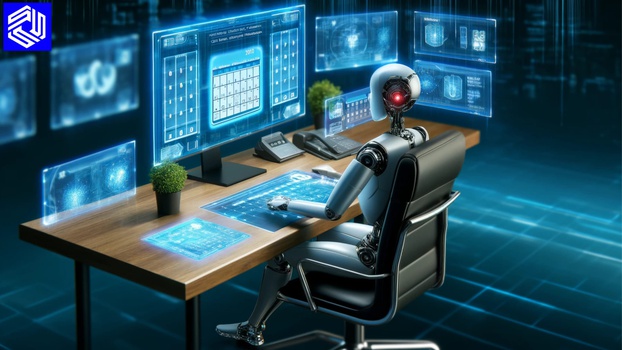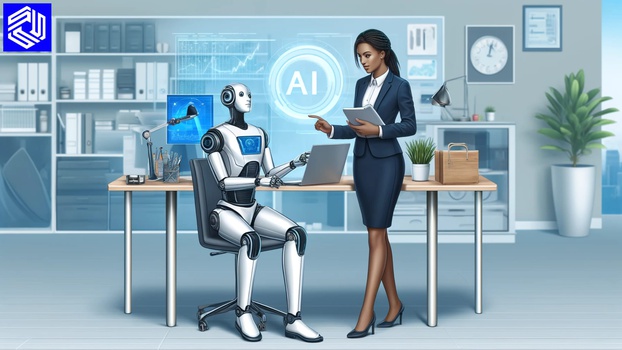AI Assistants vs. Human Secretaries: Who Wins?
Ever found yourself juggling a dozen appointments, wishing you could clone yourself just to keep up? Imagine if someone—or something—could handle all that chaos flawlessly. Well, the future is here, and it’s ready to take your calendar by storm!
Artificial Intelligence (AI) has swiftly moved from sci-fi to our desktops, offering solutions that promise to transform how we manage our time. AI assistants are increasingly becoming the go-to for individuals and businesses alike, automating the tedious task of scheduling with unprecedented efficiency. From setting up Zoom meetings to booking international conference calls, these digital maestros are redefining productivity.
Meanwhile, human secretaries have long been the backbone of professional and personal scheduling. Their personal touch and nuanced understanding of preferences and priorities ensure that every appointment is more than just a time slot; it's a carefully curated part of your day.

So, who does it better? This blog dives deep into:
- The Rise of AI in Calendar Management
- Benefits of Using AI for Appointment Scheduling
- The Traditional Touch: Human Secretaries
- Comparative Analysis: AI vs. Human
- Sector-Specific Impact of AI Appointment Scheduling: The Medical Field
The Rise of AI in Calendar Management
The integration of Artificial Intelligence (AI) into our daily routines isn't just about smarter gadgets or more efficient home appliances; it's profoundly changing how we manage time—our most precious commodity. AI has been evolving rapidly, moving from simple automated reminders to sophisticated systems capable of complex decision-making processes that seamlessly integrate into our personal and professional lives.
KaraboAI: An Example of Popular AI Calendar Assistants
KaraboAI is not just another chatbot. It’s a comprehensive chatbot generator tailored for businesses, empowering them to create multiple chatbots for various functions, including a specialized appointment scheduling bot. You want to see what we are talking about? Click here to view the demo. This AI tool simplifies client interaction by allowing appointments to be booked directly through a chat interface, which are then automatically synced to your google calendar.

KaraboAI isn’t just riding the wave of digital transformation—it’s making the waves. This powerful tool stands out by not only offering a versatile chatbot generator for various business needs but also by enhancing how appointments are scheduled and managed.
As a no-code chatbot generator, KaraboAI democratizes technology, enabling users from any background to design, create, and deploy their own AI-powered chatbots in a matter of minutes. Which means you don’t need to be a programmer or tech wizard to tap into the power of AI. Here’s how easy it is to get your bot up and running:
1. Choose Your Bot’s Role: Start by selecting what kind of tasks you want your chatbot to handle. Whether it’s appointment scheduling, customer service, or sales support, KaraboAI is flexible enough to accommodate any business need.
2. Customize the Conversation Flows: Utilize KaraboAI’s intuitive interface to set up the dialogues and interaction flows. The platform guides you through configuring your bot to ask the right questions, deliver responses, and perform tasks effectively—all without writing a single line of code. KaraboAI also offers extensive customization features, allowing businesses to tailor the look and feel of their calendars. You can adjust colors and design elements to match your business branding, creating a seamless and professional appearance.
3. Train Your Bot: Even without technical skills, you can train your bot by uploading documents, FAQs, pictures etc. By feeding it examples of typical interactions, the AI learns to handle real-life conversations with your clients.

4. Deployment (Multi-Platform Accessibility): Once your chatbot is ready, The same calendar can be accessed through WhatsApp, QR codes(Businesses can print these QR codes on business cards or promotional materials. Clients can simply scan the QR code to view availability and book appointments directly, providing a touch of modern convenience), direct links, or embedded on any website. This flexibility ensures that clients can book appointments from the platform that is most convenient for them, enhancing user experience and accessibility.
5. Multi-Calendar Management: Businesses can add and manage up to 10 calendars concurrently. This feature is invaluable for businesses like medical clinics where multiple practitioners share the scheduling system, ensuring smooth operations without overlap or conflict.

6. Dashboard Capabilities: This sophisticated platform allows business owners and team members to not only manage but also fully customize their chatbot experiences and appointment scheduling processes:

- Centralized Bot Management: From the KaraboAI dashboard, users can view all the bots they have created, access them, and make edits as needed. This centralized control makes it easy to manage multiple bots, ensuring that they are always optimized for performance and up-to-date with the business’s evolving needs.
- Appointment Management: The dashboard seamlessly integrates with Google Calendar, allowing users to see all appointments booked through the appointment scheduling bot. This integration provides a comprehensive view of daily, weekly, or monthly schedules, helping to manage and coordinate activities efficiently.
- Interaction Tracking: A crucial feature of the dashboard is its ability to track interactions that clients have with the bots. This data is invaluable as it provides insights into user engagement, preferences, and behavior patterns. Businesses can use this information to refine their bots, tailor communications, and improve the overall customer experience.
From Zero to Hero in 10 Minutes: KaraboAI’s promise is bold but simple: anyone can get their chatbot operational within 10 minutes. This rapid deployment not only saves time but also significantly reduces the barrier to entry for businesses looking to innovate their customer interaction and management strategies.
Benefits of Using AI for Appointment Scheduling

- Efficiency: AI reduces the time spent on managing appointments significantly. Automated systems can manage multiple calendars at once, checking for conflicts and optimizing schedules without breaking a sweat.
- Cost-Effectiveness: AI assistants can save organizations money by reducing the need for dedicated staff to handle appointment scheduling and management, reallocating human resources to more critical tasks.
- Error Reduction: Humans can make mistakes, like double-booking or miscommunicating time zones. AI systems, programmed to perfection, eliminate these common errors, ensuring a smoother scheduling experience.
The shift towards AI-driven calendar management is not just a trend; it's becoming a necessity in a world where time management equals money management. By automating the mundane yet crucial task of scheduling, AI is freeing up our time for more creative and strategic pursuits, ultimately enhancing productivity and satisfaction.
The Traditional Touch: Human Secretaries
While AI continues to make strides in calendar management, the enduring value of human secretaries cannot be overlooked. These professionals have long been the cornerstone of efficient time management in businesses, particularly startups, where every minute counts.

The Role of Human Secretaries in Managing Calendars: Human secretaries play a pivotal role in ensuring that entrepreneurs, doctors, and other professionals keep their commitments without a hitch. They do more than just manage appointments; they ensure the smooth operation of daily schedules. We owe a debt of gratitude to these dedicated individuals who, with precision and care, juggle multiple calendars to prevent any overlaps or missed meetings.
The Personal Touch: What sets human secretaries apart is the personal touch they bring to their roles. They understand the nuances of preference and the importance of relationship-building, often tailoring their interactions to the personalities and specific needs of those they assist. This personalization can make all the difference in a high-stakes business environment where a nuanced understanding of social dynamics is just as crucial as keeping a schedule on track.
Advantages of Human Oversight:
- Handling Complex Requests: There are certain tasks where human secretaries excel, particularly when dealing with complex, sensitive, or nuanced requests that require judgment and intuition. Whether it's negotiating a suitable time for a critical business meeting or rearranging schedules in response to unexpected changes, their ability to navigate complex scenarios is unparalleled.
- Personal Interaction: Human secretaries often act as the face of the organization, managing communications with a personal touch that AI cannot replicate. They build and maintain relationships through their interactions, which can be essential for client retention and satisfaction.
- Adaptability: Unlike AI, human secretaries can quickly adapt to new and unforeseen situations without needing pre-programmed instructions. Their problem-solving skills are invaluable, especially in dynamic environments where flexibility and creativity are required.
In an era where technology seeks to streamline every aspect of our lives, the role of human secretaries remains irreplaceably human. Their ability to understand, anticipate, and react to the unique needs of individuals they support is something that, at least for now, AI cannot fully emulate. The blend of emotional intelligence and practical skills they bring to their work not only enhances the functionality of businesses but also enriches the workplace with a sense of humanity.
Comparative Analysis: AI vs. Human

The debate between leveraging AI technology and employing human secretaries often hinges on several key factors: efficiency, cost, flexibility, and user experience. Here's a detailed comparison:
- Efficiency and Accuracy
- AI Assistants: AI systems excel in handling large volumes of appointment scheduling without fatigue, leveraging algorithms to optimize calendars in real-time. For example, KaraboAI chatbot can manage multiple schedules simultaneously, minimizing conflicts and maximizing resource utilization. Case studies have shown that in high-volume environments like call centers or medical clinics, AI can significantly reduce wait times and scheduling errors.
- Human Secretaries: Humans bring careful consideration and a personalized approach to scheduling, which is crucial in high-stakes business settings. They excel in scenarios where subtle cues and personal knowledge of stakeholders can influence the scheduling decision. However, they may be prone to errors under pressure or when handling extremely high volumes of appointments.
- Cost Implications
- AI Assistants: The initial setup cost for AI calendar management systems can be significant, but the long-term savings are substantial. AI reduces the need for multiple scheduling staff and minimizes errors that could be costly. Maintenance costs exist but are often lower than the ongoing expenses of employee salaries, benefits, and office space.
- Human Secretaries: Hiring full-time secretaries involves not just their salaries but also associated costs like training, benefits, and workspace. While more expensive in the long run, human secretaries offer value through personal interaction and the ability to manage external and internal relations which might justify the investment for some businesses.
- Flexibility and Adaptability
- AI Assistants: AI shines in scenarios requiring the management of time zone differences and global scheduling, automatically adjusting for variables that humans may need to manually check. However, AI systems can struggle with sudden, non-standard changes that require human intuition or decision-making outside of predefined parameters.
- Human Secretaries: They excel in adaptability, capable of improvising and handling unexpected changes efficiently. Their ability to negotiate and rearrange schedules on the fly without needing system updates allows for greater responsiveness in dynamic situations.
- User Experience
- AI Assistants: Feedback indicates that while many users appreciate the speed and simplicity that AI brings to scheduling, there is sometimes a noted lack of personal touch, which can affect customer satisfaction, particularly in services requiring high levels of personal interaction.
- Human Secretaries: They often score higher on customer satisfaction due to their personal approach and ability to build relationships. Their empathetic interaction can significantly enhance client loyalty and comfort, which is particularly valued in personalized services like healthcare.
Each approach has its strengths and weaknesses. AI assistants offer unmatched efficiency and cost-effectiveness, especially in handling large volumes and repetitive tasks. In contrast, human secretaries provide a personalized touch and flexibility that AI currently cannot replicate, making them indispensable in scenarios where relationships and nuanced decisions are key.
Sector-Specific Impact of AI Appointment Scheduling: The Medical Field
The healthcare sector places a premium on precision and personal care, making the management of doctor’s appointments a critical task. Both AI and human secretaries play pivotal roles in this setting, but their contributions vary significantly in terms of efficiency and the nature of patient interaction.

Use of AI and Human Secretaries in Scheduling Doctor’s Appointments
- AI Systems: AI has revolutionized how clinics and hospitals manage patient bookings. With systems capable of handling scheduling, reminders, and follow-up appointments automatically, AI allows healthcare providers to manage high volumes of patient interactions efficiently. For instance, an AI system can integrate with electronic health records (EHR) to not only schedule appointments but also suggest optimal visit times based on the patient’s medical history and doctor’s availability.
- Human Secretaries: Despite the efficiency of AI, human secretaries remain indispensable in the medical field. They handle the crucial elements of patient interaction that require empathy, discretion, and immediate decision-making, especially in sensitive health matters. Their ability to provide a comforting and understanding voice can significantly affect a patient's experience and trust in the healthcare provider.
Efficiency in Handling High Volumes of Patient Bookings
- AI Systems: AI's capability to process and organize vast amounts of data quickly makes it ideal for large hospitals or clinics that deal with hundreds of appointments daily. This high level of efficiency ensures that appointment slots are maximized and wait times minimized, which is crucial in high-demand areas such as emergency rooms or specialized medical services.
- Balancing with Human Touch: While AI can schedule an appointment, it's the human secretary who often handles the nuances—such as rearranging schedules due to an emergency or providing personalized instructions for preparation before specific procedures.
In the medical field, the integration of AI in scheduling enhances operational efficiency but does not eliminate the need for human secretaries, whose empathy and ability to handle sensitive situations remain vital. The best practice is a hybrid approach, where AI handles the bulk of scheduling tasks, allowing human staff to focus on patient care and complex case management, thereby creating a more effective and patient-centered service model.
The Verdict
Throughout this exploration of AI assistants and human secretaries, we've seen the strengths and limitations of each in managing appointments. AI brings unmatched efficiency, scalability, and cost-effectiveness to the table, handling large volumes of scheduling tasks with precision and minimal error. Meanwhile, human secretaries offer irreplaceable personal touches, adeptness at handling complex and nuanced requests, and a deep understanding of interpersonal dynamics that AI currently cannot replicate.

Future Trends:
As we look to the future, it's unlikely that AI will completely replace human secretaries. Instead, a more balanced approach seems to be emerging. This hybrid model leverages AI’s efficiency and computational power to handle routine scheduling and data management tasks, freeing human secretaries to focus on tasks that require emotional intelligence, discretion, and personal interaction. Such a partnership allows each to play to their strengths, enhancing overall productivity and satisfaction.
Moreover, as AI technology evolves, we might see smarter AI systems that can better understand and mimic human emotional responses. These advancements will further blur the lines between tasks suited only for humans and those that AI can enhance or take over. However, the essence of human touch in personalized service sectors like healthcare suggests that the demand for human secretaries will continue, albeit in a more focused and perhaps elevated role.









